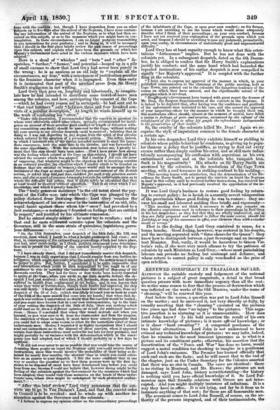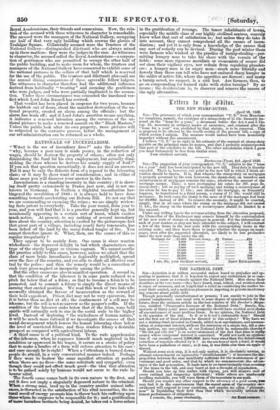: RgNEWRD CONSPIRACY IN TRARA_LGAR SQUARE ALTHOUGH the suitable custody and
lodgement of the national pictures is a subject of great magnitude, a detail in that broad question presses 'with tnote immediate in*eney -than all the rest: We, notitte:semet reason to fear that.the 'process of destruction which was inflictedion.lthe works of the Old Masters, under the name of "cleaning," Will be renewed this year.
Tint hefote the roiess„ a question was put to Lord John Russell on the matter he answered it, not 'very directly (Sr: fully, by roundly asserting that the " cleaning '? °imaged on the pictures
two years age had done 'no injury:" to the pictures. This nega- tive assertion is as 'alarming as • it is unaccountable. How does
Lord John know? Is his bold assertion the result of his own
intimate knowledge of pictures; is it mere -oiruial knowledge ; or is it sheer "hard swearing" ? A compoimd perchance of the two latter alternatives, Lord John is not understood to have
evinced any technical knowledge of pictures: We may infer, indeed, that he remains- in the most iiinooent ignerance as to what is a picture and its constituent parts otherwise'-' hie assertion that the
decortioation of the "Peace and War" has done no harm, would suggest a moral condition too shocking to imagine in a gentleman
of !Lord jokes eminence. The Premier has learned officially that such and such aro the facts ; and he will assert that to the end of the chapter, just as the Under Secretary for the Colonies asserted that there was no riot in Canada. The cases are identical: there is no rioting in Montreal, said Mr. Hawes the pictures are not damaged,- says Lord John, history history is nothing until you have official ..ietiledgli3' of it. So Lord Pal-
merston says that friendly. relations -with, Greece are not inter- rupted. And You might multiply instances ad infinitum. It is a
way they have in offiee. It is not lying, and far be it from us to insinuate anything of that sort; for these are all honourable men. The averment comes to Lord John Russell, of course, on the au- thority of the persons impugned, and of their testimonialists, the
Royal Academicians, their friends and connexions. Now, the rela- tionof -the accused with these witnesses to character is remarkable. The accused were the manager's of the National Gallery, occupying one half of That very ugly building which crowns the glories of Trafalgar Square. Collaterally accused were the Trustees of the National Gallery—distinguished dilettanti who are always mixed up in these matters : they were the judges inthe case. As witnesses to character, the accused called the Royal Academicians—a corpora- thm..of gentlemen who are permitted to occupy the other half of the public building, and to make room for whom, -the trustees and managers of the National Gallery have consented to exhibit some of the national pictures in the cellars of that half which is reserved for the use of -the public. The trustc\--; and dilettimti aforesaid are the annual dining companions of these agreeable fellow lodgers. The witnesses to character therefore had the -additional influence derived from habitually "treating" and amusing the gentlemen who were judges, and who were partially implicated in the accusa- tion. 'Under these circumstances was concocted the barefaced ver- dict which Lord John Russell has revived.
• That verdict has been placed in suspense for two years, because the hubbub out of doors, about the manifest destruction of the na- tional property, created an alarm among the officials.; but the alarm has worn off; and if lard John's assertion means anything, it indicates a renewed intention among the curators of the na- tional pictures to make a renewed assault on the "Black Masters." Unless the public look after its -own property, more pictures will be -subjected to the corrosive process, before the management of our art-administration can be reformed as a whole.



























 Previous page
Previous page